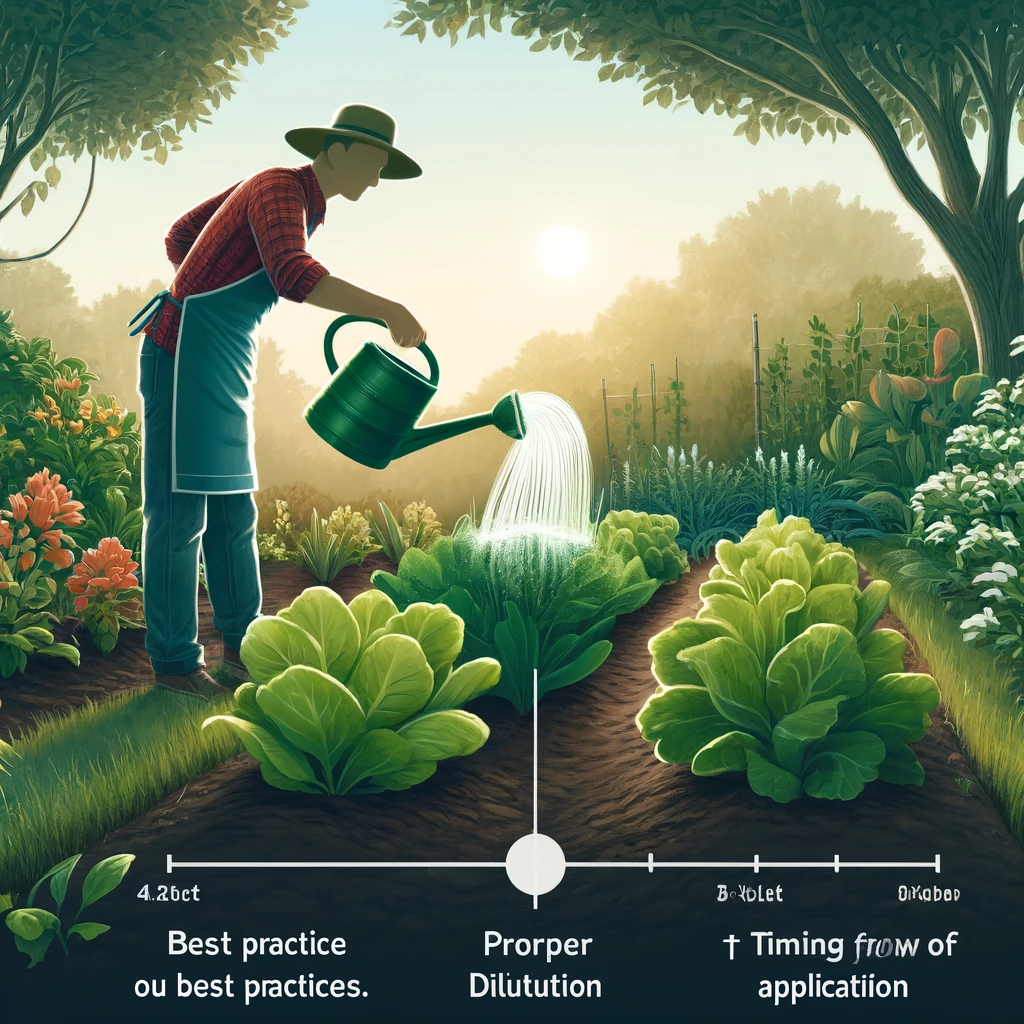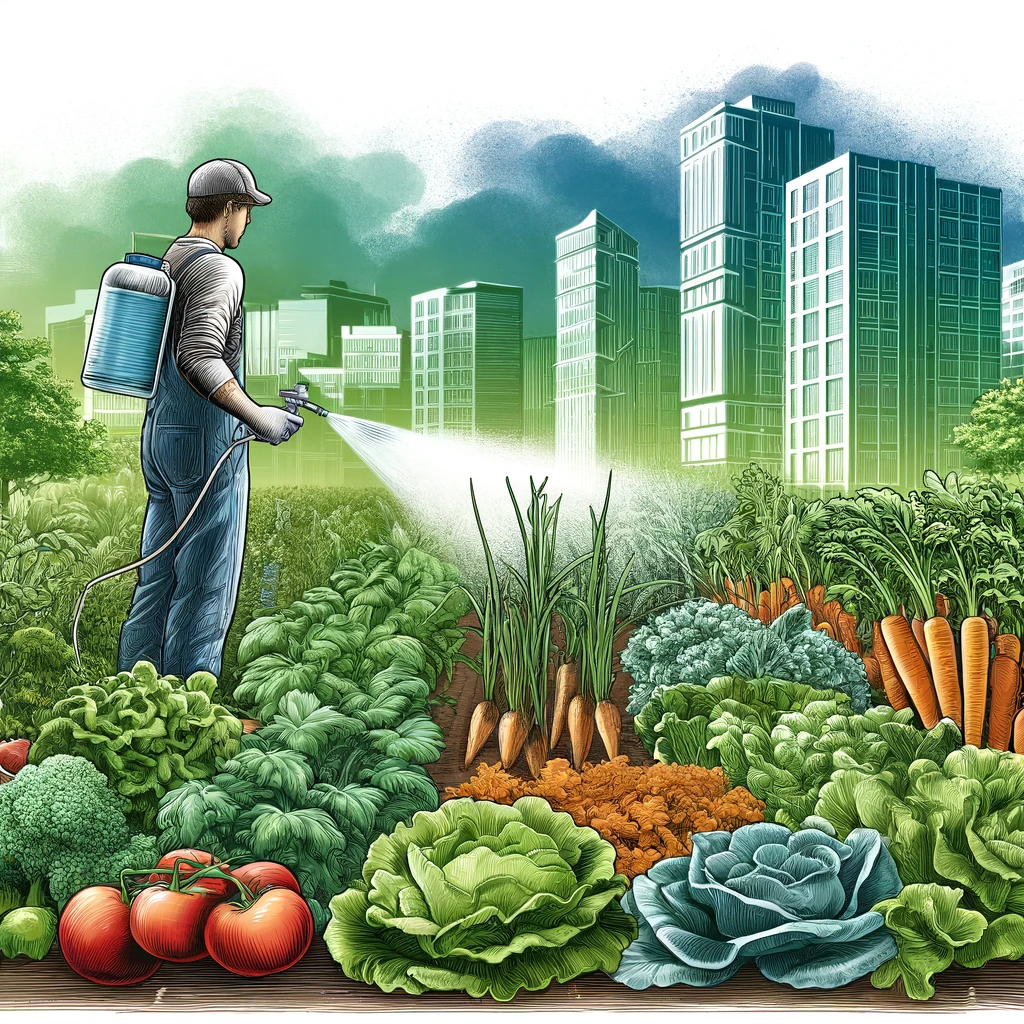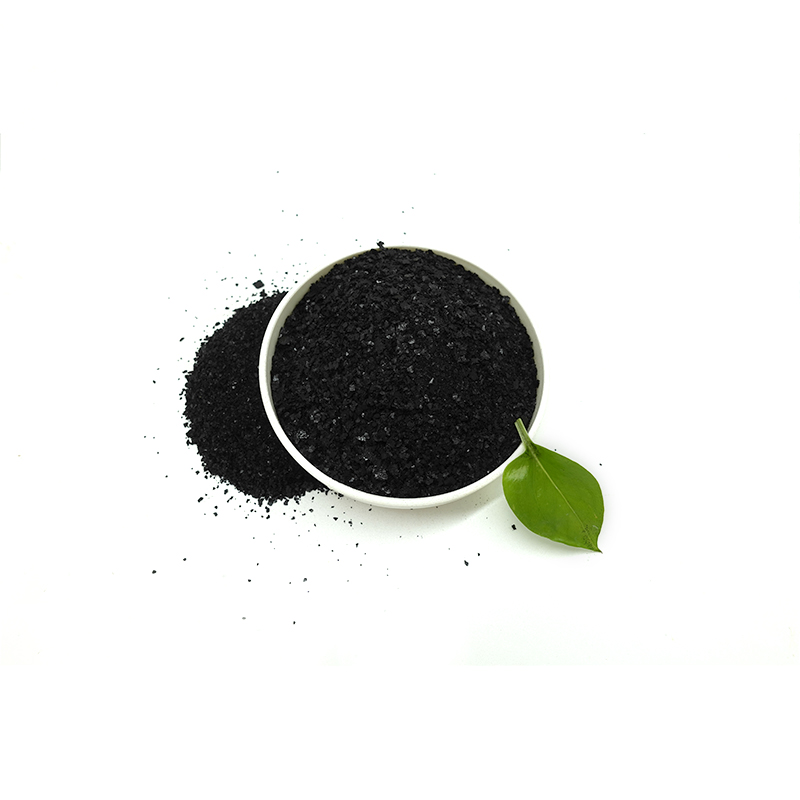Introduction: Understanding Organic Liquid Fertilizers for Vegetables
Now we look at the ways to make vegetable garden as large as possible and as full of healthy vegetables as possible. The first thing to take care is about the kind of fertilizer.
If we want to feed all the plants in our veggie garden, we need to grow enough healthy plants. Would it be efficient or benefit the environment. Rather than using kinds of fertilizers, what we need is the organic liquid fertilizer.
This organic liquid fertilizer for vegetable has natural origin that could be extract from natural things like fish extract , sea weed , vegetable matter and animal by-product where it has been procesed into a liquid form that can be absorbed easily by plants. Therefore a liquid fertilizers are good for rapid nutrient delivery.
In contrast to synthetic fertilizers, going for liquid organic fertilizer is obviously better in many ways. It’s safer for you, the plants, the water supply and the environment. When used on vegetables, it releases the nutrients more slowly, at a more even pace, unlike those synthetic ones that give meteoric growth until it peaks, then browses. It also helps loosen up and add water-retention to the soil that’s bound to house your future crops.
It is important to select the proper organic materials liquid fertilizer aiding the vegetable farming processes when starting a vegetable business. There are several reasons contribute to this.
Overcoming the most important is different types of vegetable have a different requirements. For example, potatos may require more nitrogen than corn. Besides, some vegetable need more sun light to grow, they will become taller than some other which require more water to develop root. In this case, the fertility of soil also make a huge difference. Furthermore, some old plants require a different fertilizer compare to the young one.
Selecting the most suitable sort of organic material aiding vegetable growth can increase the proportion of growth. Too much heavy fertilizer will result in many water need to be added, large amount of fertilizer can also cause algae growth, any of these can lead to a huge amount of nutrient which can flow to the river or ocean, furthermore, damage the environment such as oxygenelysis.
With the basic knowledge of how to make organic liquid fertilizer for vegetables, a gardener can now give their plants more favorable conditions to improve their growth and yield while enhancing their gardening skills. They will also be able to produce these nutritional liquid fertilizers naturally with zero toxicity, making their gardening activities eco-friendly.
Key Ingredients in Organic Liquid Fertilizers for Vegetables
This section outlines the essential nutrients found in organic liquid fertilizer for vegetables, crucial for any gardener or farmer aiming to enhance vegetable growth healthily and optimally.
Macro and Micronutrients Provided by Seaweed-Based Fertilizers
- Macronutrients: Nitrogen (N), Phosphorus (P), and Potassium (K) – These are fundamental for all plants, required in relatively large amounts:
- Nitrogen is critical for leaf and stem growth, being a key component of chlorophyll.
- Phosphorus aids in the development of roots and flowers, facilitating energy transfer within the plant, which stimulates growth.
- Potassium regulates plant metabolism, enhancing photosynthesis and enzyme activation, helping plants build proteins and improve water utilization.
- Micronutrients: Essential in smaller quantities, these nutrients help plants prevent diseases and maintain robust growth:
- Elements like Iron (Fe), Manganese (Mn), Zinc (Zn), Copper (Cu), and Boron (B) are commonly found in organic liquid fertilizers and are vital for supporting plant enzyme systems and overall health.
Natural Hormones and Vitamins
- Cytokinins, Auxins, and Gibberellins: These natural plant hormones in seaweed-based fertilizers stimulate cellular development, growth, and root development, and can enhance fruit size and yield.
- Vitamins: Vitamins such as B and E increase disease resistance and reduce plant stress, contributing to overall plant health.
How Organic Ingredients Differ from Conventional Fertilizers
- Unlike synthetic fertilizers, which often lead to nutrient runoff and soil degradation due to their highly bioavailable nutrient forms, organic liquid fertilizers provide a slow-release of nutrients. This mimics natural nutrient availability, allowing plants to absorb nutrients as needed over time, reducing the risk of over-fertilization and environmental impact.
By choosing organic liquid fertilizer for vegetables, gardeners and farmers not only nourish their plants but also contribute to the creation and maintenance of healthy, living soil. This soil becomes rich with a complex blend of natural nutrients and beneficial compounds, supporting a vibrant ecosystem around the plants.

Choosing the Right Organic Liquid Fertilizer for Your Vegetables
Selecting the ideal organic liquid fertilizer for vegetables is essential for maximizing plant health and productivity. This guide outlines key considerations to help you make an informed choice for your vegetable garden.
Understanding Nutrient Needs
Different vegetables require specific nutrients at various stages of growth. Understanding these needs is crucial to selecting a fertilizer that offers the right balance. For instance, leafy greens thrive with high nitrogen levels which support leaf development, while root vegetables like carrots benefit from phosphorus, which is essential for root growth.
Assessing Soil Condition
Soil type significantly affects nutrient absorption and availability. Conducting a soil test to determine your garden’s baseline nutrient levels and pH is vital. This information will guide you in choosing a fertilizer that enhances your soil’s nutrient uptake capabilities.
Choosing the Right Formulation
Organic liquid fertilizers come in various formulations, including seaweed-based, fish emulsion, and compost tea. Each type suits different vegetables and growing conditions, making it important to select a formulation that matches the specific needs of your garden.
Application Strategy
The effectiveness of an organic liquid fertilizer also depends on its application method and timing. Fertilizers should be applied at critical growth phases such as planting and during peak fruiting periods to ensure plants receive the necessary nutrients when they need them most.
Brand Comparisons and Reviews
Researching and reading reviews can provide insights into which products are most effective for gardens similar to yours. Choose reputable brands that are transparent about their ingredient sourcing.
Environmental Impact
Consider the environmental impact of the fertilizers you use. Opt for products made from renewable resources or those that contribute positively to ecological sustainability. This approach ensures that your gardening practices are environmentally responsible and aligned with sustainable principles.
By considering these factors, you can choose an organic liquid fertilizer that not only meets the nutritional needs of your vegetables but also supports sustainable gardening practices. This careful selection process ensures that your garden remains productive, healthy, and environmentally friendly.
Application Techniques for Maximum Efficiency
Proper application of organic liquid fertilizer for vegetables is crucial to maximize plant health and ensure efficient use of nutrients.
Best Practices for Fertilizer Application
- Timing: Applying organic liquid fertilizer at key growth stages is essential. Early season application supports root and leaf development, while later applications boost flowering and fruiting, enhancing productivity and plant vitality.
- Method of Application:
- Foliar Application: Spraying fertilizer directly onto leaves is effective for quick nutrient uptake, especially if plants show deficiency symptoms.
- Soil Application: Applying granular fertilizer directly to the soil benefits soil microbes, which support plant health. Fertilizer should be diluted in water and applied around the plant base to be absorbed by the roots.
- Dilution Rates: Always follow the manufacturer’s instructions for diluting fertilizers to avoid under-diluting, which can be ineffective, or over-diluting, which can cause nutrient burn.
Recommended Application Rates and Intervals
- Adjust fertilizer application based on plant needs and fertilizer strength. Frequent, diluted applications are preferable to occasional heavy applications.
- Typical intervals for applying organic liquid fertilizer are every 2-4 weeks during the growing season, adjusting based on environmental conditions and plant growth stages.
Common Mistakes to Avoid
- Overapplying: Can lead to nutrient runoff, environmental pollution, and harm to plants.
- Application in Hot Sun: Can cause the fertilizer to evaporate and potentially burn the foliage. Apply early in the morning or late in the evening to avoid these issues.
- Neglecting Soil pH: Fertilizer effectiveness can be limited by inappropriate soil pH. Ensure the soil pH is suitable for the vegetables being grown.
By adopting these application techniques, you can efficiently use organic liquid fertilizer, promoting robust vegetable growth and contributing to sustainable gardening practices. This thoughtful approach helps maintain a productive garden and supports the ecological health of the soil.
Case Studies: Success Stories from Using Organic Liquid Fertilizers
Organic liquid fertilizers have demonstrated exceptional results in various farming and gardening environments. Here are some success stories that illustrate the transformative impact of organic liquid fertilizers on vegetable and fruit production.
California Organic Market Garden
- Details: This small-scale market garden in California transitioned to using organic liquid fertilizer.
- Application: Fortnightly applications of a seaweed-based liquid fertilizer were made throughout the growing season.
- Results: The use of organic liquid fertilizer led to increased production of greens and root vegetables, improved vegetable quality, and enhanced soil health due to heightened microbial activity and better moisture retention.
- Overall Impact: The consistent application of organic liquid fertilizer has enabled many farmers to achieve higher marketable yields and increased profitability in food production.
Florida Tomato Farm
- Summary: A tomato processing farm in Florida switched to organic liquid fertilizer to reduce chemical usage and enhance profitability.
- Application: The fertilizer was applied every three weeks during peak growth periods.
- Results: Tomatoes grown with organic liquid fertilizer were larger, tastier, and more disease-resistant, which increased customer satisfaction and boosted sales at local markets.
- Market Adaptation: The use of organic liquid fertilizers significantly improved fruit quality, helping farmers address some challenges associated with organic farming and meet consumer expectations for high-quality organic produce.
Urban Rooftop Garden in New York City
- Summary: An urban rooftop garden maximized space utilization by using organic liquid fertilizers.
- Implementation: Gardeners applied a mixture of organic liquid fertilizers tailored to the specific needs of various crops during optimal growth phases.
- Results: The strategic use of organic liquid fertilizers led to a denser planting arrangement and higher yields, proving that even limited urban spaces can produce abundant crops with the right fertilization practices.
- Urban Farming Efficiency: This case highlights that urban gardens can thrive with the use of organic liquid fertilizers, enabling effective and productive use of limited gardening spaces.
These real-world examples underscore the efficacy of organic liquid fertilizers across different settings and scales, showing that regular use in both conventional and innovative farming practices not only boosts production but also supports sustainable agricultural methods.

Future Trends in Organic Fertilization
The use of organic liquid fertilizer for vegetables is an integral part of a broader movement towards sustainable and regenerative agriculture. Here are some key emerging innovations and future trends in organic fertilization that are set to reshape the agricultural landscape.
Emerging Innovations in Organic Fertilizer Production
- Technological Advancements: New technologies in bio-fermentation and enzymatic processes are enhancing the effectiveness and efficiency of organic fertilizers, making them more bioavailable to plants.
- Customized Fertilizer Blends: As agronomic science advances, companies are increasingly offering fertilizers tailored to specific crop, soil, and environmental conditions, optimizing plant health and yield.
Regulatory Changes and Organic Practices
- Tighter Regulations: Environmental regulations are becoming stricter, particularly concerning nitrogen and phosphorus runoff. This trend is likely to encourage the adoption of organic fertilizers, which generally have lower risks of leaching and runoff.
- Certification and Labeling: With a growing consumer demand for sustainable and organic products, there will likely be an increase in the certification and labeling of organic fertilizers to ensure transparency and build consumer trust.
Sustainability Considerations
- Reducing Carbon Footprint: Innovations aimed at reducing the carbon footprint of fertilizer production, distribution, and application are gaining importance.
- Local Production: There is a growing trend towards locally produced organic fertilizers, which helps reduce transportation emissions and supports local economies by utilizing local organic waste materials for fertilizer production.
Integration with High-Tech Farming Techniques
- Precision Agriculture: Organic liquid fertilizers are being increasingly integrated with high-tech farming practices such as drip irrigation and precision farming. This integration allows for the precise application of fertilizers, reducing waste and enhancing effectiveness.
- Increased Research and Development: There is expected to be a continued investment in research and development to further improve the efficiency and environmental sustainability of organic liquid fertilizers.
These trends illustrate a promising future for organic liquid fertilizer in vegetable cultivation, emphasizing sustainability, efficiency, and environmental stewardship. The ongoing advancements and increased regulatory support suggest that organic liquid fertilizers will continue to play a critical role in sustainable agriculture.
Conclusion
To sum up,the plus points of using organic liquid fertilizer for vegetables are countless and have serious influence over home growner and commercial farmers.This guide explored the significant factors you need to consider in choosing and using the right organic liquid fertilizer to boost growth of vegetables as well as health of soil.
An organic liquid fertilizer is, then, an ecologically neutral way to manage your vegetable garden nutrient requirements. Providing a balanced nutrient profile in a form that the plants can readily use, while at the same time being gentle to the soil and the environment, it improves soil structure, increases microbial activities and minimises the risk of chemical run-off from your garden. Above all, using an organic liquid fertilizer allows you to enjoy a beautiful and productive garden in the knowledge that you are also contributing to a healthier planet.
When we decided to use of organic liquid fertilizer instead of nanomaterials, we took a step towards sustainable agriculture. Organics produce more and healthier vegetables than chemical fertilizers and also encourage the development of a more healthy ecosystem. Using of organic compounds gives the vegetables the best condition for enhancing their growth rate, yield, and fertility. Hence organic liquid fertilizer is a better solution to gardening.
In choosing this organic liquid fertilizer, you not only get the most growth out of your vegetable garden this summer, but you also lend your support to a broader endeavour to actively take responsibility for our planet’s finite resources.
FAQs: Common Questions About Organic Liquid Fertilizer for Vegetables
What is organic liquid fertilizer?
Organic fertilizer contains liquid, which comes from plant extracts, animal feces, seaweed, or other natural sources, and is processed into an easy to use, liquid form. This product helps vegetables obtain important nutrients. Organic fertilizer has a variety of benefits. it contains rich natural nutrients that are easy to absorb by the vegetables and helps them grow healthy. With people’s increased health awareness, vegetables are easily accepted by the consumers. Organic fertilizer is environmentally friendly as it has no negative impact on the soil, unlike cheap chemical fertilizers which can spoil the soil structure. Overall, it can be said that organic fertilizer is better for vegetabe’s growth than unnatural chemical methods.
How often should I apply organic liquid fertilizer to my vegetables?
The frequency at which to apply depends on the vegetables being grown, the type of product, and the growing conditions. As a general guideline, it can be applied every 2-4 weeks, and always follow the instructions of the fertilizer manufacturer.
Can organic liquid fertilizer burn my plants?
However, while the use of organic fertilizer produces less potential for a damaging nutrient burn than does the use of synthetic fertilizer, too much of a good thing is possible. I’ve lost many plants by applying too much fertilizer and not diluting it properly.
Is organic liquid fertilizer better than granular fertilizer?
Liquid and granular organic fertilizers provide better options: Liquid fertilizers are absorbed quickly by plants and can be evenly applied, making them good for a rapid supply of nutrients; and granular fertilizers release slowly and are adequate for a long-term supply.
Can I make my own organic liquid fertilizer at home?
Sure, you can make your own organic liquid fertilizer: compost or manure tea, or worm casting tea. Homemade organic liquid fertilizers made with compost, manure or kitchen waste are cost effective and environmentally friendly.
Are there any vegetables that should not be fertilized with organic liquid fertilizer?
Although most of the vegetables will be happy to receive the liquid organic fertilizer, they require different nutrients, and it is very important to know how much of each nutrient is needed by each vegetable as over application and nutrient disproportion will ruin their quality.
Here are some references on organic liquid fertilizer for vegetables:
- Oregon State University Extension Service provides a comprehensive guide on how to choose and use organic fertilizers, including liquid types for vegetables. This resource is particularly valuable for understanding the balance of nutrients necessary for different types of vegetables and the timing of fertilizer application to maximize plant health and yield.
- Cornell University Cooperative Extension offers detailed insights on organic gardening, including the benefits of using organic fertilizers. Their resources include tips on selecting the right type of organic fertilizer based on the specific needs of garden vegetables.
- National Gardening Association provides articles and community advice on organic gardening, including the use of organic liquid fertilizers. This platform can be a great way to connect with other gardeners and experts who share first-hand experiences and tips.







